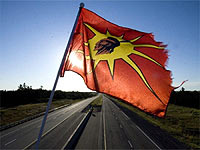 Another Stereotype of the Month entry:
Another Stereotype of the Month entry:
 Another Stereotype of the Month entry:
Another Stereotype of the Month entry:
Bodog Domain Name: Scott Lewis vs Mohawk War Party?
Written by Thomas Jensen
Saturday, 08 September 2007
I think Scott Lewis and 1st Technology (see Patent Trolls) might have messed with the wrong Indians when they seized control of the Bodog domain name portfolio late last month. Calvin Ayre, Founder of Bodog Entertainment, announced on Friday a North American licensing agreement for the Bodog gaming channel to the Morris Mohawk Gaming Group. Point-Spreads.com was told about the the licensing agreement with Morris Mohawk while attending the filming of Bodog Fight Vancouver, which was the weekend before control of the domain names was turned over to 1st Technology.
Mohawk is an Algonquin term that means "eaters of men". In ancient times, the Mohawk sometimes practiced cannibalism in order to obtain the strength of their conquered enemies and the Native American tribe prides themselves on fighting to the death if necessary. Point-Spreads.com has heard that the Mohawks are very pissed their domain names being "stolen". I wonder if Scott Lewis knew he would be in danger of being eaten alive or scalped by the toughest group of people in all of North America when the patent troll won his $48 million default judgment.
The Oka Crisis was a land dispute between the Mohawk nation and the town of Oka, Quebec over the town's desire to build a golf course on Mohawk sacred burial grounds. The Oka Crisis lasted from July 11th thru September 26th, 1990 and resulted in three deaths. It was the first of a number of well-publicized violent conflicts between the Mohawk people and the Canadian government in the late 20th century.
Surprisingly, the Mohawk issue their people passports from the Mohawk nation and the passports are recognized and accepted by customs officials of several countries including the United States of America. This level of international acceptance of nationhood is unparalleled by any other Indian tribe. Can you imagine the look on Scott Lewis's face if a Mohawk War Party showed up at his doorsteps to settle the Bodog domain name dispute! You think this sounds far fetched, well tell that to Joseph Onasakenrrat. Chief of the Oka Mohawk people, Joseph Onasakenrat took a small armed force of Mohawks to confront a Church that was overseeing its land holdings improperly.
Rob's comment
The second paragraph
Mohawk is an Algonquin term that means "eaters of men". In ancient times, the Mohawk sometimes practiced cannibalism in order to obtain the strength of their conquered enemies and the Native American tribe prides themselves on fighting to the death if necessary. Point-Spreads.com has heard that the Mohawks are very pissed their domain names being "stolen". I wonder if Scott Lewis knew he would be in danger of being eaten alive or scalped by the toughest group of people in all of North America when the patent troll won his $48 million default judgment.
is full of stereotypical phrases that suggest the Mohawks are savages and cannibals.
Here are some facts about the Mohawks:
How do you pronounce the word "Mohawk"? What does it mean?
It's pronounced "mo-hawk." It comes from a name their Algonkian enemies used to call them, meaning "man-eaters." In their own language, the Mohawk people call themselves Kanienkehaka, which means "people of the flint."
Were they really man-eaters?
It's not clear anymore whether that name was supposed to be literal, or an insult, or just a figure of speech to show that the Mohawks were fierce. Some Mohawk people believe that in ancient times, before they joined the Iroquois Confederacy, their ancestors used to eat enemies they had killed in battle. Other Mohawks think that never really happened and cannibals were always rare and strange in Mohawk society, like they were in other cultures.
In short, it sounds like the reports of Mohawk cannibalism were either exaggerated or invented.
|
. . . |

|
All material © copyright its original owners, except where noted.
Original text and pictures © copyright 2007 by Robert Schmidt.
Copyrighted material is posted under the Fair Use provision of the Copyright Act,
which allows copying for nonprofit educational uses including criticism and commentary.
Comments sent to the publisher become the property of Blue Corn Comics
and may be used in other postings without permission.